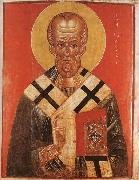China al por mayor de Marco de Oleo
|
|
|

|
|
|
|
|
|
|
|
|
|
|
|
|
|
|
El clic para Ampliar
|
| Icon of St Nicholas
|
| 13th-14th century Egg tempera on panel, gesso ground, 107 x 82 cm The Hermitage, St. Petersburg Novgorod Veliky (Novgorod the Great) is one of the oldest Russian towns. In the 12th to 15th centuries it was the centre of a large republic, whose art was greatly influenced by popular ideas of beauty. This was especially striking in the art of painting of the 13th and early 14th centuries, the period to which the Hermitage icon of Saint Nicholas is dated. Its red background is usually noted, for the vivid red (cinnabar) background combined with the lemon-coloured halo and the bluishgreen vestment of the saint make a striking impression. The beauty of the icon is enhanced by the careful graphic treatment of the forms and by the ornamental design. The saint is represented as sublime and severe in accordance with the standard developed in the Christian art of Byzantium. But the vivid colours and embellishments adopted from folk art soften the hieratic posture and stern countenance, turning the austere Byzantine saint into the Russian Nik?la, who was believed to be involved in all of humans' daily doings and cares. Artist: UNKNOWN MASTER, Russian , Icon of St Nicholas , 1301-1350 , Russian , painting , religious
|
|
|
| Pintura identificación:: 65249
|
|
|
|
|
|
|
|
|
unknow artist
13th-14th century Egg tempera on panel, gesso ground, 107 x 82 cm The Hermitage, St. Petersburg Novgorod Veliky (Novgorod the Great) is one of the oldest Russian towns. In the 12th to 15th centuries it was the centre of a large republic, whose art was greatly influenced by popular ideas of beauty. This was especially striking in the art of painting of the 13th and early 14th centuries, the period to which the Hermitage icon of Saint Nicholas is dated. Its red background is usually noted, for the vivid red (cinnabar) background combined with the lemon-coloured halo and the bluishgreen vestment of the saint make a striking impression. The beauty of the icon is enhanced by the careful graphic treatment of the forms and by the ornamental design. The saint is represented as sublime and severe in accordance with the standard developed in the Christian art of Byzantium. But the vivid colours and embellishments adopted from folk art soften the hieratic posture and stern countenance, turning the austere Byzantine saint into the Russian Nik?la, who was believed to be involved in all of humans' daily doings and cares. Artist: UNKNOWN MASTER, Russian , Icon of St Nicholas , 1301-1350 , Russian , painting , religious
|
|
Related Paintings to unknow artist :.
| Mill hand | Sarah Bringing Hagar to Abraham | Hunting of Hawks,Syria | Arab or Arabic people and life. Orientalism oil paintings 323 | Susanna and the Elders gmg | |
|
|
|
|
|
|
CONTACTE EEUU
China de Xiamen el Petróleo al por mayor que Pinta la Barra de Soga Marco al por mayor que Moldea el Espejo Pinturas Estiradas Encuadradas |
|








